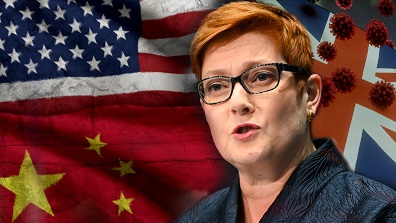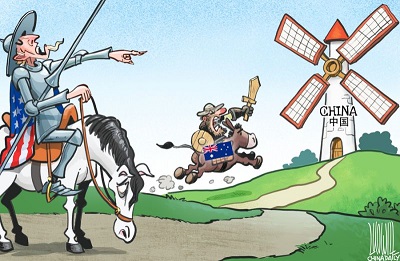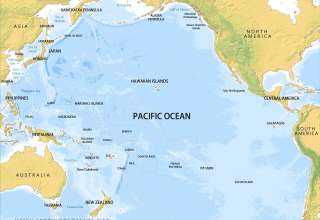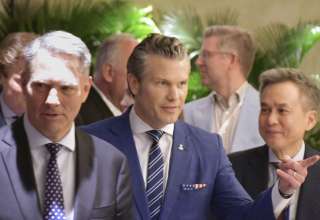by Brian Boyd, June 2020
 The question of how the ‘call’ by Australia for an independent, international enquiry about the origins of the Covid-19 pandemic came about, back in April, is worth inquiring about itself. At first blush it is a reasonable proposition for the world to want to learn all about how this pandemic began. However ALL of the circumstances that led to its breakout need to be explored and evaluated, not just what happened at a specific location, in one country and in a short timeline.
The question of how the ‘call’ by Australia for an independent, international enquiry about the origins of the Covid-19 pandemic came about, back in April, is worth inquiring about itself. At first blush it is a reasonable proposition for the world to want to learn all about how this pandemic began. However ALL of the circumstances that led to its breakout need to be explored and evaluated, not just what happened at a specific location, in one country and in a short timeline.
The ever-growing, dangerous US conflict with China is making it very difficult to put such an important task in a proper context. Now that the world health assembly (WHA) has agreed that the world health organisation (WHO), with universal support, is to carry out an investigation, the role of Australia, in this issue deserves to be considered with a critical eye. Australia’s credibility globally is on the line, with many commentators subsequently coming out, saying it looks like our government was simply a surrogate for US foreign policy.
There is no doubt that one of the issues for the upcoming WHO co-ordinated enquiry would be the way the initial breakout was handled and came about.
But the core issue for the investigation is far more serious. It is the revelation that there has been long-term global negligence of pandemic scientific research over many decades.
There has not been a lot of coverage to date given to the fact that the world health organisation-WHO-had already established a group of public health experts back in 2015 (that included US and Chinese scientists) to investigate and draw up a list of dangerous viruses, specifically those with no vaccines or drugs available.
Surely this issue merits far more focus than the squabbling between the two economic superpowers.
The WHO list included a notional virus dubbed “Disease X”. This was a stand-in for all the unknown pathogens that were yet to emerge.
A spokesperson for the ‘US forum on microbial threats at the national academies of sciences, engineering and medicine’ deemed Covid-19 as ‘exactly the kind of threat that Disease X was meant to represent’. That is a new very infectious coronavirus, with a high mortality rate and no existing treatment or prevention.
The spokesperson says that the problem is not that prevention is impossible, in fact it is very possible, but we couldn’t follow up searching for solutions as governments deem the necessary research as ‘too expensive’ and pharmaceutical companies only operate ‘for profit’.
The WHO has neither the funding nor the power to enforce large-scale world collaboration to plan for future pandemics.
Back in 2005 then US president George W Bush put forward a proposal for a US $7 billion in funding to prepare for the inevitable epidemic. He cited at the time his proposal arose from the danger of another coronavirus, H5N1 or “bird flu”.
In 2016 former Australian Prime Minister Kevin Rudd was commissioned to write a major report on UN reform. He devoted a whole section to the need for pandemic preparedness. He pointed out that the WHO had not been able to respond effectively to the outbreak of Ebola in Africa in 2013.
Infectious-disease experts say the scientific tools already exist to create a viral-defence framework in order to pursue a broad range of research projects, to develop vaccines and drugs to fight a wide range of pathogens. They argue that it is essential to design, across the board, anti-viral drugs and vaccines aimed at tackling most types of influenza and coronavirus’s, rather than just one at a time as they occur.
It is argued that we should have had a package of such solutions ‘long ago’, particularly since SARS in 2003. The only reason this didn’t occur is because there wasn’t ‘enough financial backing’. No one was willing to pay for their development.
Back in March 2020 Professor Edward Holmes of the University of Sydney, considered a leading expert on genetics and evolution of the origin of viruses, said the world should have been working on coronavirus vaccines for years but governments have become “complacent”.
Similarly Doctor Michelle Baker of the CSIRO and a leading bat virus researcher, echoed the complacency problem and said “it gets really difficult to get funding when there is not an outbreak”.
Despite many efforts there is one overarching problem. There is still much to learn about the earth’s viral community.
Literally millions of viruses are yet to be analysed. Some scientists recently set up an ambitious venture called the Global Virome Project, which seeks to identify 70% of the estimated 1.6 million zoonotic viruses estimated to be a threat to humans. The project needs, at 2020 figures, $1.2 billion for 10 years work.
The big question remains whether the political and financial will can come about globally, post Covid-19. This needs to be the key element in any ‘fair dinkum’ enquiry into the current Covid 19 health crisis.
The current tension between rival major powers only distracts from this long-term culpability and negligence.
EXPOSE THE PRO-WAR HAWKS OPPORTUNISM
The pro-war, pro-conflict narrative gaining media attention in recent years is now being enhanced and further promoted off the back of the Covid-19 health crisis. This phenomenon needs to be exposed and confronted at the same time.
The US superpower has the greater military firepower than any other country in the world, including China. Clearly with this in mind the pro- war hawks promoting an orchestrated anti-China campaign every day in the US and in Australia, want conflict sooner rather than later. Some commentators are suggesting that we are moving “ever closer to full-scale confrontation”. The ‘dogs of propaganda war’ are very busy. Military posturing by all major power blocs, increases every day.
But back to the antics of Payne and Morrison.
On Sunday, April 18 last Australian Foreign Minister Marise Payne announced that Australia would be seeking a “review” of the Covid-19 pandemic. This quickly became a call for a so-called independent enquiry seeking transparency about how the virus outbreak occurred. Later that week Prime Minister Morrison described the call for an enquiry as “a pretty honest ambition”.
Much of the mass media went along with the government’s line that this was an Australian initiative. Senator Payne failed to give due acknowledgement to the fact that she and US Secretary of State Mike Pompeo had talked on the phone on Thursday, 16 April, just two days earlier, where it was agreed Australia and the US needed to ‘coordinate’ their global response to the pandemic. In that same week Prime Minister Morrison had also spoken to President Trump on the phone about the same issue.
These conversations received little publicity at the time, but any educated guess could reasonably point to the Americans wanting Australia to be seen to lead the charge on ‘sticking it to’ the Chinese. Morrison went on to say Australia’s engagement with the WHO was also under review (mimicking President Trump’s attack on an organisation) and said it was part of his governments review of engagement with all international bodies, under the heading- tackling “negative globalism” (again mimicking President Trump).
In some diplomatic circles the Payne/Morrison call for an enquiry into the pandemic was described as off- the- cuff and lacked the usual standards of diplomatic courtesy. Senator Payne in particular had gone public before any effort at all was put into testing the proposition, never mind building wider support behind the scenes.
Some commentators openly stated that Morrison had launched his enquiry proposal simply “to please Washington”. One commentator said: “it is easy to imagine the White House urging Canberra to help out by joining its chorus of accusations against Beijing”.
The Morrison government ambushed
Under the cover of the Morrison governments enquiry call, US Secretary of State Mike Pompeo came out unilaterally and claimed there was “enormous evidence” that the coronavirus came from a research laboratory in Wuhan, China. His comments were echoed by President Trump.
Trump said he had seen evidence that gave him up “high degree of confidence” about the pandemic beginning at the Wuhan laboratory. The US president initially said he ‘couldn’t talk about it’, but later a report out of Washington indicated that US intelligence agencies were examining mobile phone data it had obtained in October 2019 concerning the Wuhan Institute of Virology. (Data vacuumed up by National Security agency-NSA-spy satellites).
Mike Pompeo said he backed Scott Morrison’s ‘initiative’ and criticised China for reacting negatively to the Australian ‘initiative’.
Pompeo’s comments about possessing “enormous evidence” were given worldwide coverage, especially in Australia by a number of major media outlets. At one stage limited sections of the media subsequently revealed that the US had not shared any specific intelligence with Australia to back Mr Pompeo’s claim.
Prime Minister Morrison was forced to come out to contradict Pompeo on his claims, saying he had no specific intelligence to support it.
Pompeo eventually backtracked from his “enormous evidence” claim and President Trump never followed up on his “high degree of confidence” position.
Former Australian Prime Minister John Howard surfaced, cautioning the Morrison government to be more pragmatic in its dealings with China, suggesting “to suddenly turn our relationship with China on its head…[is]… not going to serve our interests”.
By 6 May even the pro-US journalist Greg Sheridan also cautioned Trump in pushing the line on the ‘lab conspiracy’ suggesting that criticising Beijing along these lines loses the US superpower “the moral high ground”! Sheridan said the international intelligence community believes it is not possible that the virus escaped into humans from the lab. Even Andrew Bolt, following on from Sheridan, saying that both Mike Pompeo and Donald Trump “are almost certainly wrong” and commended Prime Minister Scott Morrison for not “buying it”.
These two journalists, besides revealing the close relationships with both domestic and foreign spy agencies, are actually coming from a position of not wanting the US to undermine the campaign against China, by resorting to desperately painting scenarios that don’t stand up to public scrutiny.
The pro-US war hawks pushed on with their daily commentary unabashed.
The employer of Sheridan and Bolt, News Corp Australia, didn’t blink and soon after gave wide publicity to a so-called “Western government dossier” that suddenly surfaced, purporting to prove that the Covid-19 virus did emerge from Wuhan lab in China.
Another newspaper, The Age, then revealed that the US Embassy was the source of the confected report that the News Corp outlets had promoted widely. It was shown that the document contained no intelligence information and was simply made up of publicly available material such as sweeping statements from politicians and newspaper reports. Some commentators said the US Embassy had blatantly interfered in Australian politics. Mike Pompeo some days later walked away from his original claims and stated he was just trying to get “clarity”!
A week later (21/5/20) US secretary of state Mike Pompeo let the cat out of the bag when he said “We stand with Australia… now who have taken up the American call for an enquiry into the origins of the virus…”.
The Morrison government had surely been used and abused. PM Morrison was embarrassed and briefly went to ground. Meanwhile Foreign Minister Payne went missing in action (MIA) for weeks!
Back in February, within a number of official bodies, there was already widespread global agreement that the pandemic experience would have to be reviewed. This was weeks before the Australian government claimed ownership of the idea. Much of the media did not report the February development. When Marise Payne and Scott Morrison put their hand up in April the context of such a review changed from seeking better preparedness for such pandemic contingencies in the future, to a purely political context in which Australia’s political leaders did nothing to quell the view that their position was taking apart is in view in the growing rivalry between the US and China.
It was a guileless exercise that now has been totally overshadowed by the signing on with the WHO process.
OVERBLOWN PANDERING TO THE US SUPERPOWER
 The claim by the Australian government that its call for an independent enquiry into the pandemic was eventually backed by the world is ‘overblown’ and desperate pandering. The final resolution that won unanimous support at the world health assembly (WHA) at the end of the third week of May, was not based on any Australian wording.
The claim by the Australian government that its call for an independent enquiry into the pandemic was eventually backed by the world is ‘overblown’ and desperate pandering. The final resolution that won unanimous support at the world health assembly (WHA) at the end of the third week of May, was not based on any Australian wording.
It was a proposition put forward by the European Union and Australia was simply one of the 137 countries that co-sponsored it. In particular, and most Australian media outlets never pointed this out, the resolution didn’t even mention China but emphasised the need to tackle the virus and its impact, with the WHO given the task to set up the enquiry sometime in the future.
Australian Foreign Minister Marise Payne in April said that any review should not involve the WHO, contemptuously indicating it would be like having “the poacher and gamekeeper” working together. Similarly Prime Minister Morrison had been for some time characterising the WHO as needing a complete shakeup, in the same way as US president Trump had been doing for months.
Marise Payne subsequently changed her tune, saying she accepted that there is the “expertise” within the WHO to conduct ‘a thorough enquiry’.
The pro-war hawks, such as Senator Concetta Fierravanti-Wells, who had been on the sidelines cheering on Morrison and Payne for weeks, attacked the final resolution outcome as “watered-down” and not having any “reference to China”.
Some mainstream commentators then ventured out of the woodwork to say that Australia had become ‘collateral damage’ in the larger brawl between the US and China. This followed on from much teeth gnashing over the impact on trade in general and the potential damage to the farming sector in particular.
News Corp hypocrisy
The Murdoch press has been determined to promote conflict and tension between the US and China.
It is unashamedly pro-US economic and imperial interests.
Yet by mid-May (17 May 2020) it ran an editorial that lambasted yet another ridiculous comment by President Donald Trump. The editorial started with: “Donald Trump is unlikely to find much support for the … view expressed in the White House on Friday that we don’t even need a vaccine for Covid-19 to ‘go away’… It goes a long way towards explaining his ill-judged absence from last week’s important virtual summit of 40 world leaders, including Scott Morrison, which a remarkable $12.4 billion was pledged to speed up and expand global cooperation to find a vaccine.”
The headlines of this very interesting editorial read: “US missing in action on vaccine-concerted global cooperation is needed to fight pandemic”. The Australian for many months has editorialised and run countless stories that totally undermined that concept of global cooperation.
MORE PUBLIC SCRUTINY NEEDED
The Australian public deserve to know more about what is happening behind the scenes both within Australia and globally.
The deterioration in relations between China and the US is increasingly a dangerous development. There are definitely signs that something much deeper is occurring, and a potential clash between these two great powers over what they perceive as their vital interests, could have great repercussions for the world.
But back to the pro-war hawks, who like to paint the picture that American primacy, especially since the end of World War II, is being threatened by China’s economic development. China’s embracing of technologies and growing its economy was encouraged for decades. It’s involvement in international trade, free markets, and globalisation in general, was enthusiastically promoted by the US and all other economic and political power blocs. China’s economic success is now seen as impacting on a ‘spheres of influence’ in the Indo Pacific region that the US particularly sees as its own.
Washington complains about the de-industrialisation of America’s mid-west. Yet this economic outcome solely arose out of decisions made in the board rooms of US corporations over many decades.
Similarly Washington laments its overall loss of prestige and global influence. Yet it is incapable of recognising its strategic mistakes post-cold war, such as provoking Russia by expanding NATO eastwards, embarking on the disastrous invasion of Iraq and embracing many repressive regimes including Saudi Arabia, while bleating about human rights violations in China.
The US-China stand-off is deeper than what much of the media would like us to believe. Every now and again some of the experts and commentators in the geopolitical arena reveal from time to time some of the machinations that are going on. Looking at some of this open source information clearly indicates that Australia should not have to choose between the US and China.
The US pushback against China is clearly opening up our country to the most challenging security environment we have seen since the Second World War. The indications are that the US and China (followed by Russia, Britain, the European Union, Japan and on a sliding scale various other nations), are expanding their pre-war ‘toolkits’ such as propaganda, disinformation campaigns, media manipulation, financial inducements, and the use of economic, diplomatic and military pressure for strategic purposes.
US military power projection in the Western Pacific and its push to enhance cutting-edge technology is part of the scenario. One commentator indicated that a “hot war” is a “distinct possibility”, suggesting that in the short term a “corrosive” political war will see a period of great-power competition that will further disrupt trade, global supply chains and the Internet.
With the geographic centre of gravity moving to the Indo-Pacific, Australia has been dragged into the US side of this pivot, firstly by Julia Gillard then by Malcolm Turnbull and even more enthusiastically by Scott Morrison.
It is important to realise that the two major tenancies in politics in Washington (Republicans or the Democrats) are unanimous in the view that China’s growth must be curtailed in order to shore up the US corporate sector. Most commentators agree that strategic competition, containment and the ongoing de-coupling with China will continue under whoever wins the next US presidential election.
It is too simplistic to define the current level of US-China competition on the personalities of Xi Jinping and Donald Trump. Clearly this global tension is a function of the current structure of the economic international system.
UNDERSTANDING THE WIDER, MORE DANGEROUS DYNAMICS
The transformation of the Cold War warriors of the 20th century into the pro-war hawks of the 21st century are pushing for a more finite resolution than just ongoing tension and competition. The Covid-19 academic has brought this danger closer to the surface.
It is the accelerating gravity of the situation that is the most worrisome. Some commentators are saying increasingly this could lead to a full-blown kinetic, that is a hot war conflict between the two worlds’ major powers. Any miscalculation could trigger such an outcome.
Recently the White House released a detailed paper outlining changes to its policy on China. Entitled: “United States strategic approach to the People’s Republic of China”, it deemed China is harming “vital American interests” and indicated this view was a whole-of-government consensus.
Former chief strategist to the US president, Steve Bannon said the current situation could easily head “on a path to war, to kinetic war… we are sliding rapidly… into an armed conflict…” Putting aside this pro war hawks’ bombastic rhetoric, it is a worry in itself that such commentary is getting wide spread coverage, especially in the US.
Bannon openly states that the original, patient paradigm of encouraging China to embrace the so-called ‘rules-based international economic order’ has failed and that the only approach that the US should now take is to engage in “unabashed strategic conflict”. He says that the China-US rivalry is the most serious issue confronting the world today. He adds “the most single most important thing [that pandemic has done] is that it has clarified…[and]…made things crystal-clear… Were in a war with [China].”
Other commentators are just as blunt, spelling out that the industrial decoupling from China is linked to ‘the decline in availability of the world’s finite natural resources’.
Another commentator at the beginning of June express concern at the intensity of the strategic confrontation between Beijing and Washington and foreshadowed that the economic and political divorce would result in a major reshaping of global power.
Ross Babbage, CEO of Strategic Forum in Canberra, said “the tensions generated by the increasingly strident rhetoric on both sides of the Pacific could trigger a major crisis… This could easily trigger a major war. We should not underestimate the risks.”
ANTI-WAR CAMPAIGN NEEDED NOW
The Australian public need to take a closer interest in these fast moving international events. Not only are mainstream politicians like Morrison, Payne and Albanese being drawn into the game playing of the major powers, but there are pro – war politicians, think tanks, commentators and certain journalists who seem hell-bent on dragging Australia into a hot war.
It is a no-win situation that somehow Australia has to choose between its relationship with China and its relationship with the United States. We need a truly independent foreign policy with our own strategic plan for the betterment of our nation, rather than simply being made to make a binary choice. It is clearly in our interests to have a stable balance of power in the Indo Pacific region and we should be making a contribution to ensuring that all tensions are manageable.
We specifically need to be very wary of the pro-war lobby manufacturing and exaggerating threats to national security, our values and sovereignty.
Australia must not be drawn into another war.




